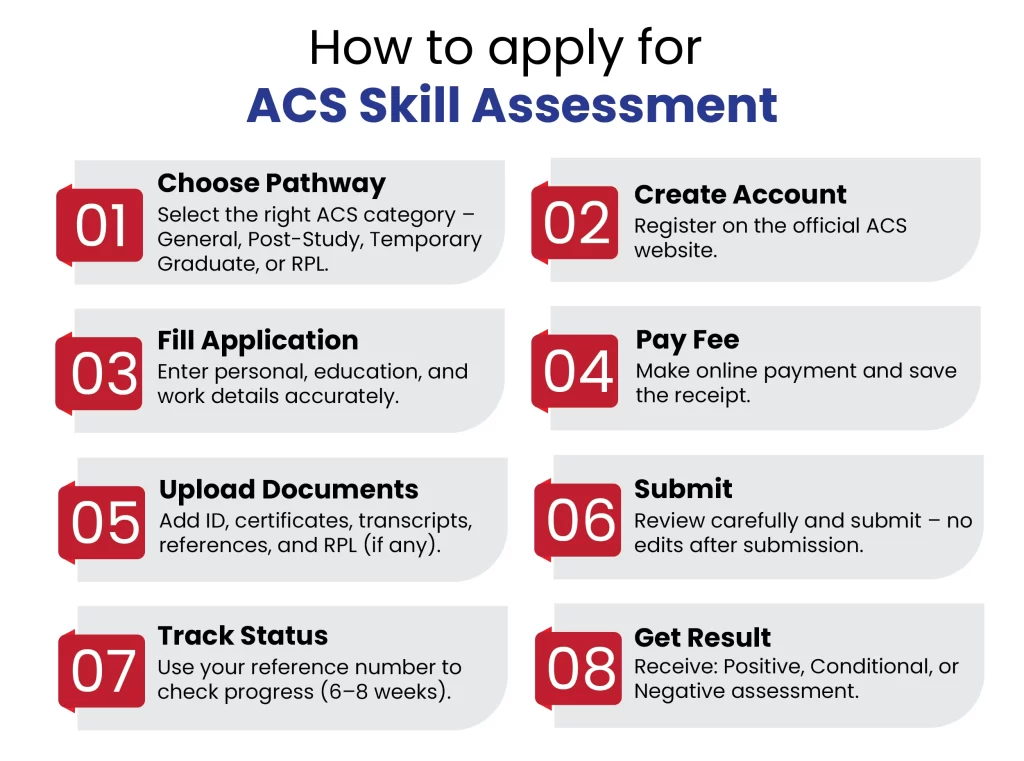Before you can call yourself an Aussie tech professional, there’s one gatekeeper you need to impress: the ACS Skill Assessment. But what is it really, and how does it work? Don’t worry, we’re about to break it all down for you. From eligibility to application tips, here we’ll cover everything you need to know to make your ACS journey smooth and successful.
Table Of Content
1What is ACS Skill Assessment?2Who Needs ACS Skill Assessment?3Which Occupations Need ACS Skill Assessment?4ACS Skill Assessment Checklist5How to apply for ACS Skill Assessment6ACS Skill Assessment Fees7ACS Skill Assessment Processing Time7Frequently Asked Questions
What is ACS Skill Assessment?
The ACS Skill Assessment is an official evaluation conducted by the Australian Computer Society (ACS) for Australia immigration, verifying whether an applicant’s education and professional experience in the ICT field meet Australian industry standards.
It is a crucial requirement for IT professionals aiming to migrate to Australia under skilled visa programs, as it determines eligibility for occupations listed under the Australian and New Zealand Standard Classification of Occupations (ANZSCO).
Who Needs ACS Skill Assessment?
Anyone planning to migrate to Australia under an ICT-related skilled visa must undergo the ACS Australian Skill Assessment. This includes professionals in fields such as software engineering, systems analysis, network administration, database management, cybersecurity, and other IT occupations.
Specifically, ACS assessment is required for:
- Professionals in ICT occupations, including Software Engineer, Systems Analyst, Network Administrator, Database Administrator, Cybersecurity Specialist, ICT Business Analyst, Developer Programmer, and other related roles.
- Skilled migration applicants applying under subclass 189, 190, or 491 visas.
- IT graduates who wish to demonstrate that their qualifications meet Australian standards.
- Professionals without formal ICT degrees but with substantial work experience, who may apply through the Recognition of Prior Learning (RPL) pathway.
Essentially, if your nominated occupation for Australia immigration falls under the ICT sector in the ANZSCO list, you must secure a positive ACS Skill assessment before submitting your visa application.
Which Occupations Need ACS Skill Assessment?
The ACS Skill Assessment is required for all ICT occupations listed on the ANZSCO (Australian and New Zealand Standard Classification of Occupations) list for Australia immigration. Applicants must ensure their job role matches the Australia ANZSCO code assessed by ACS.
The following occupations need ACS skill assessment:
1. Software Engineer / Developer Programmer
2. Systems Analyst / Business Analyst (ICT)
3. Network Administrator / Network Analyst
4. Database Administrator / Database Analyst
5. Cybersecurity Specialist / ICT Security Specialist
6. ICT Support Engineer / ICT Consultant
7. Multimedia Specialist / Web Developer
In general, any occupation classified under the ICT sector for skilled migration purposes will require a positive ACS assessment before you can lodge your visa application. Many of these ICT roles are also listed among the In-Demand Jobs in Australia, making a positive ACS assessment even more crucial for skilled migration.
ACS Skill Assessment Checklist
To ensure a smooth ACS Skill Assessment process for Australia immigration, applicants must prepare the following documents carefully. Submitting incomplete or incorrect documents is one of the most common reasons for delays or refusals.
1. Identity Documents
- Passport (bio page)
- Government-issued ID (driver’s license, national ID card, etc.)
2. Educational Qualifications
- Degree/award certificate (bachelor’s, master’s, or diploma)
- Academic transcript/marksheets (must clearly show subjects, grades, and completion dates)
- If using RPL, explain why formal qualifications are not available
3. Employment Evidence
- Employment reference letters from current and previous employers
- Letters must include:
- Job title and dates of employment
- Detailed roles and responsibilities
- Company letterhead, contact person, and contact details
- Supporting documents (pay slips, tax statements) may strengthen the application
4. RPL Documents (if applicable)
- Two RPL project reports detailing professional ICT work experience
- Project 1: within the last 2 years
- Project 2: within the last 4 years
- Each report should map tasks to ACS knowledge areas
5. Other Supporting Documents
- Statutory declarations (if required)
- Any additional proof of professional experience or training
How to apply for ACS Skill Assessment
The ACS Australian Skill Assessment evaluates the qualifications and work experience of IT professionals to ensure they meet standards for Australia Immigration. It is a key step for those seeking skilled migration to Australia in ICT-related occupations.
Here’s a step-by-step guide to help you navigate the ACS Skill Assessment process smoothly:
1. Choose the Right Assessment Pathway
- General Skills Assessment – for applicants with an ICT degree.
- Post-Australian Study – for those who completed an ICT qualification in Australia.
- Temporary Graduate – for recent Australian graduates.
- Recognition of Prior Learning (RPL) – for applicants without formal ICT qualifications but with significant work experience.
2. Create an ACS Account
- Visit the official ACS website.
- Register as a new applicant and complete your profile with personal details.
3. Complete the Online Application Form
- Fill in your personal information, qualification details, and employment history.
- Ensure all information is accurate and matches your supporting documents.
4. Pay the Assessment Fee
- Payment is done online via credit/debit card or other accepted methods.
- Keep the receipt for reference.
5. Upload Supporting Documents
- Upload scanned copies of identity documents, educational certificates, transcripts, employment references, and RPL reports (if applicable).
- Follow ACS guidelines for document format and size.
6. Submit the Application
- Review the application thoroughly before submitting.
- Once submitted, adding new documents is generally not allowed, so ensure everything is complete.
7. Track Your Application
- ACS will provide a reference number to track your application.
- Typical processing time is 6–8 weeks for standard applications (may vary).
8. Receive Outcome
- Positive Assessment – fully meets requirements.
- Positive with Conditions – approved with minor clarifications or conditions.
- Negative Assessment – does not meet requirements; reasons provided.
ACS Skill Assessment Fees
The ACS Skill Assessment requires a fee based on the chosen assessment pathway. Fees must be paid online at the time of application, and they are essential for processing your application for Australia immigration.
| Assessment Pathway | Fee (AUD) |
|---|---|
| Temporary Graduate 485 | $625 |
| Post Australian Study | $1,136 |
| General Skills | $1,498 |
| Recognition of Prior Learning (RPL) | $625 |
| Level 1 Appeal | $516 |
| Level 2 Appeal | $620 |
Note: Fees are exclusive of GST and may be updated periodically on the ACS website.
ACS Skill Assessment Processing Time
The ACS Migration Skills Assessment typically processes applications within 15 days, especially when all required documentation is complete and accurate.
However, during peak periods or following holiday closures, applicants may experience delays of 3 weeks or more.





